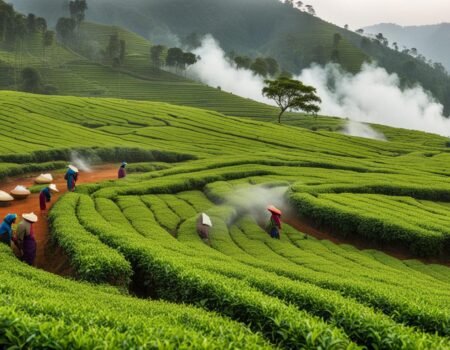
Organic Practices for Growing Tea: Essentials
Welcome to our comprehensive guide on organic practices for growing tea. In this article, we will explore the key elements of organic tea farming, including cultivation techniques, site selection, pest management, environmental impact, marketing strategies, and the challenges and opportunities that organic tea farmers face. So grab a cup of your favorite organic tea and let’s dive in!
Key Takeaways
- Organic tea cultivation aims to have a sustainable plantation that conserves the environment.
- Organic tea farmers avoid the use of synthesized chemicals and instead rely on natural alternatives.
- The site selection for organic tea cultivation is crucial to ensure the absence of pollutants.
- Pest and disease management in organic tea farming focuses on preventive measures.
- Organic tea farming promotes biodiversity and helps mitigate the impact of climate change.
Selecting the Right Site for Organic Tea Cultivation
When it comes to organic tea cultivation, selecting the right site is crucial for ensuring the success and sustainability of your farm. The site should be free from pollutants or contaminants that could compromise the organic integrity of your tea. It is recommended to have a buffer zone around your farm to minimize the risk of contamination from neighboring non-organic farms or external sources.
Another important factor to consider is the soil profile depth. Ideally, the soil should have a minimum depth of 1.5 to 2.0 meters to allow for proper root development and nutrient uptake. A healthy and fertile soil is the foundation for growing high-quality organic tea.
In addition to the soil, having access to a perennial source of unpolluted water is essential for large-scale compost preparation. Compost is a vital component of organic tea farming and plays a significant role in building soil fertility and promoting overall farm sustainability. By maintaining a detailed history of external inputs during the pre-conversion period, you can provide transparency and assurance of your organic farming practices.
“The organic tea farm should be a sanctuary for biodiversity, ensuring a harmonious coexistence between nature and tea cultivation.”
Furthermore, sustainability should be a key focus when selecting a site for organic tea cultivation. By implementing soil and water conservation measures, you can minimize erosion and protect the surrounding environment. Maintaining optimal soil pH and nutrient management through compost and organic manures are essential practices that contribute to the long-term sustainability of your organic tea farm.
To summarize, selecting the right site for organic tea cultivation involves ensuring the absence of pollutants, having adequate soil depth, access to unpolluted water, maintaining a transparent history of inputs, and implementing sustainable practices. By making informed choices in site selection, you can lay the foundation for a successful organic tea farm that thrives in harmony with nature.

Essential Practices for Organic Tea Cultivation
Organic tea cultivation requires a meticulous approach to ensure the highest quality and purity of the tea leaves. While organic farming practices eliminate the use of synthetic chemicals, they require additional labor and careful pest management strategies. Here, we explore some essential practices for successful organic tea cultivation and the challenges that farmers may face.
Manual Labor and Pest Management
Organic tea farming relies heavily on manual labor, as additional workers are needed for various tasks throughout the cultivation process. These tasks include trenching, compost preparation, weed control, and the application of organic manures. The use of machinery is limited in order to maintain the organic integrity of the tea plantation.
One of the key challenges in organic tea farming is pest management. Without the use of synthetic pesticides, organic tea farmers must rely on preventive measures and natural pest control methods. This includes using resistant clones, balancing nutrient supply, introducing parasites and predators, employing herbal sprays, and implementing cultural operations. By implementing these practices, farmers can maintain a healthy ecosystem within their tea gardens while protecting the tea leaves from pests.
Challenges in Organic Tea Farming
While organic tea farming offers numerous benefits, it also poses specific challenges for farmers. One of the main challenges is weed control, as organic farmers cannot use herbicides to eliminate unwanted vegetation. Instead, farmers must employ manual weeding techniques and implement mulching or ground cover plantings to suppress weed growth.
Another challenge lies in maintaining organic certification standards. Organic tea farmers must adhere to strict guidelines and undergo regular inspections to ensure compliance. This includes keeping detailed records of all farming practices and external inputs for inspection. Any deviation from organic practices can jeopardize the organic certification status.
Organic Tea Farming and Environmental Impact
Organic tea farming practices not only prioritize the production of high-quality, chemical-free tea but also have a positive impact on the environment. By avoiding the use of synthesized chemicals like pesticides and herbicides, organic tea farms promote biodiversity and contribute to the conservation of natural habitats.
Shade trees and ground cover plantings are essential components of organic tea farming. These provide a conducive environment for diverse flora and fauna, supporting a rich ecosystem. The presence of different plant species attracts beneficial insects and birds, aiding in natural pest control and pollination. This, in turn, reduces the reliance on chemical interventions for pest management.
Furthermore, organic tea farming practices play a role in combating climate change. By focusing on sustainable agricultural practices, such as soil conservation and water management, organic tea farmers contribute to the reduction of greenhouse gas emissions. The use of organic manures helps improve soil fertility and promote carbon sequestration, aiding in the mitigation of climate change impacts.

Promoting Biodiversity in Organic Tea Farms
“Organic tea farms create a thriving environment for diverse plant and animal species, supporting an ecologically balanced ecosystem.” – Organic Tea Farmer
The presence of shade trees and ground cover vegetation in organic tea farms provides shelter and food sources for a wide range of organisms. These diverse habitats attract beneficial insects, birds, and other wildlife, contributing to a thriving ecosystem. By promoting biodiversity, organic tea farms maintain the delicate balance of the natural environment, ensuring the sustainability of the tea plantation in the long term.
Addressing Climate Change
- Soil Conservation: Organic tea farming practices focus on building and maintaining healthy soils. By avoiding synthetic chemicals, organic tea farmers prevent soil degradation and erosion, helping to preserve valuable agricultural land.
- Water Management: Organic tea farms employ water conservation techniques such as irrigation scheduling and rainwater harvesting. These practices minimize water waste and contribute to the efficient use of this precious resource.
- Sustainable Agriculture: Organic tea farming promotes the use of renewable resources and sustainable farming practices. By reducing reliance on synthetic inputs, organic tea farmers contribute to the overall sustainability of the agricultural sector and help combat climate change.
In conclusion, organic tea farming practices have a positive impact on the environment by promoting biodiversity and addressing climate change. These practices create a healthy ecosystem that supports diverse plant and animal species while reducing greenhouse gas emissions. By choosing organic tea products, consumers can not only enjoy the benefits of chemical-free tea but also contribute to a greener and more sustainable future.
Marketing Organic Tea: Meeting Consumer Demand
As the demand for organic products continues to rise, so does the popularity of organic tea. Consumers are becoming more conscious of their health and the environment, and they are actively seeking out organic options. This presents a significant opportunity for tea farmers to meet this growing demand and market their organic tea products.
When marketing organic tea, it is essential to highlight the organic certification and sustainable farming practices. These certifications, such as USDA Organic or Fair Trade, validate the farmer’s commitment to organic farming methods and assure consumers that the tea they are purchasing is produced without the use of synthetic chemicals. By emphasizing these certifications, farmers can build trust with consumers and differentiate their products in the market.
In addition to certifications, it is crucial to communicate the unique flavor profiles of organic teas. Organic tea farming often involves a more holistic approach to cultivation, which can result in teas with distinctive tastes and aromas. By showcasing the unique qualities of their teas, farmers can pique consumer interest and create a sense of exclusivity around their products.
Strategies for Marketing Organic Tea
- Product labeling: Clearly label your organic tea products with the appropriate certifications and information about your sustainable farming practices. This will make it easier for consumers to identify your organic teas and understand the benefits they offer.
- Communication of organic values: Use your marketing materials, website, and social media platforms to communicate the values of organic farming and the positive impact it has on the environment and consumer health. This will resonate with consumers who are passionate about sustainability.
- Educational campaigns: Raise awareness about the benefits of organic tea through educational campaigns. Share information about the health benefits of organic tea, the environmental advantages of organic farming, and the unique flavor profiles of organic teas. This will help consumers make informed choices and further drive the demand for organic tea.
By effectively marketing their organic tea products, farmers can tap into the increasing consumer demand for organic options. Highlighting organic certification, sustainable farming practices, and unique flavor profiles will attract consumers who value health, sustainability, and quality. With the right marketing strategies in place, organic tea farmers can thrive in this growing market and contribute to a greener and healthier world.
Challenges and Opportunities in Organic Tea Farming
Organic tea farming, while offering numerous benefits, also presents unique challenges that farmers need to address. One of the main challenges is weed control, as the absence of synthetic herbicides requires manual labor and alternative weed management techniques. This includes regular hand-weeding, mulching, and the use of cover crops to suppress weed growth. While it may require more effort, organic weed control methods contribute to soil health and reduce the risk of chemical residue in tea leaves.
Pest and disease management is another significant challenge in organic tea farming. With the limited use of chemical pesticides, farmers rely on integrated pest management strategies, such as biological controls, trap crops, and pheromone traps. Regular monitoring and early detection are crucial to prevent outbreaks and minimize crop damage. By adopting organic pest control methods, farmers not only protect the environment but also produce healthier tea leaves that are free from pesticide residues.
Maintaining organic certification standards is also an ongoing challenge for organic tea farmers. Strict adherence to organic farming practices, record-keeping, and regular inspections are necessary to meet certification requirements. Any deviation from the organic standards can jeopardize the organic certification status. However, by consistently following organic practices and keeping up with the latest guidelines, farmers can ensure the sustainability and credibility of their organic tea farms.
Despite these challenges, organic tea farming presents significant opportunities for farmers. The increasing consumer demand for organic tea offers a potential market advantage for organic tea farmers. By producing tea that is free from synthetic chemicals and promoting their sustainable farming practices, farmers can tap into the growing market segment of health-conscious consumers. Additionally, organic tea farming aligns with sustainable agriculture principles, contributing to environmental conservation and ecosystem preservation.
Overall, organic tea farming requires dedication and continuous improvement to overcome the challenges and seize the opportunities. By embracing organic practices, farmers contribute to the sustainability of the tea industry, protect the environment, and meet consumer demand for healthier and more environmentally-friendly tea products.
Conclusion
Organic tea growing practices provide a multitude of benefits for both the environment and consumers. By implementing sustainable farming methods, tea farmers can contribute to a greener planet while meeting the increasing demand for organic tea. The use of organic practices ensures environmental sustainability by avoiding the use of synthetic chemicals and promoting soil and water conservation.
One of the key benefits of organic tea cultivation is biodiversity conservation. By embracing organic practices, tea farmers create a rich and diverse ecosystem, fostering the growth of shade trees and ground cover plantings. This not only supports local wildlife but also contributes to the overall health and balance of the tea farm.
Organic tea cultivation also offers healthier tea products for consumers. By abstaining from the use of synthetic chemicals, organic teas are free from harmful residues, providing a natural and pure tea experience. This contributes to the growing trend of health-conscious consumers seeking organic options for their daily tea consumption.
While organic tea farming requires careful attention to soil management, pest control, and maintaining organic certification standards, the benefits far outweigh the challenges. Organic tea farmers have the opportunity to differentiate their products in the market, support environmental sustainability, and contribute to local economies. As we continue to refine our techniques and collaborate with experts, organic tea farming will flourish as a profitable and sustainable endeavor.
FAQ
What is organic tea cultivation?
Organic tea cultivation is a method that aims to have an ecologically sustainable plantation by avoiding the use of synthesized chemicals like pesticides, fungicides, and herbicides. Instead, organic tea farmers use naturally occurring, mined products and organic manures.
How long is the conversion period for organic tea cultivation?
The conversion period from conventional to organic tea cultivation is three years. Organic tea can only be marketed after this period.
What are the cultural practices in organic tea farming?
Cultural practices in organic tea farming include soil and water conservation measures, maintaining optimal soil pH, and nutrient management through compost and organic manures.
What should be considered in site selection for organic tea cultivation?
The site for organic tea cultivation should have a buffer zone, a minimum soil profile depth of 1.5 to 2.0 meters, and a perennial source of unpolluted water for large-scale compost preparation.
How do organic tea farmers manage pests and diseases?
Organic tea farmers primarily focus on preventive measures for pest and disease management. This includes using resistant clones, balanced nutrient supply, parasites and predators, herbal sprays, and cultural operations.
What impact does organic tea farming have on the environment?
Organic tea farming promotes environmental biodiversity by avoiding the use of synthesized chemicals. Shade trees and ground cover plantings contribute to biodiversity conservation. Organic tea farming also addresses climate change through sustainable agriculture practices, soil conservation, and reduced greenhouse gas emissions.
How can organic tea farmers market their products?
Organic tea farmers can market their products by highlighting the organic certification, sustainable farming practices, and the unique flavor profiles of organic teas. Certifications like USDA Organic or Fair Trade can validate their organic farming practices.
What are the challenges and opportunities in organic tea farming?
Organic tea farming faces challenges such as weed control, pest and disease management, and maintaining organic certification standards. However, it also presents opportunities for farmers to differentiate their products, meet consumer demand, contribute to environmental sustainability, and support local economies.
What are the benefits of organic tea growing practices?
Organic tea growing practices offer benefits such as environmental sustainability, biodiversity conservation, and healthier tea products for consumers. By adopting organic practices, tea farmers can contribute to a greener planet and meet the growing demand for organic tea.






